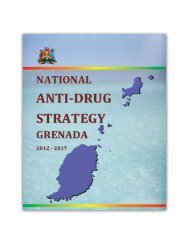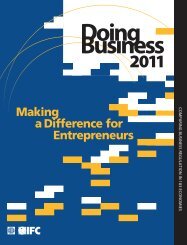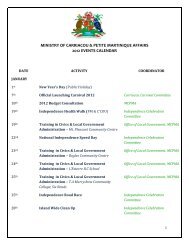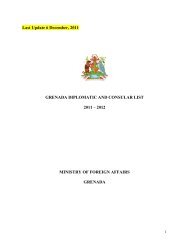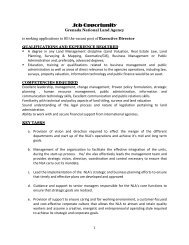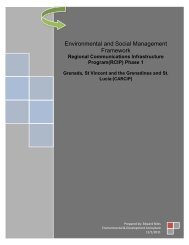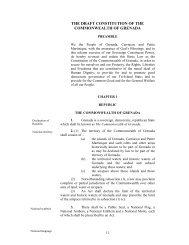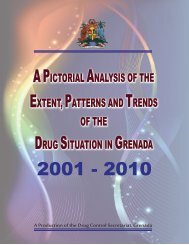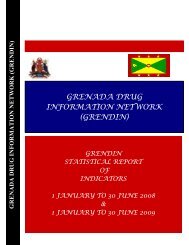Doing Business 2009 - Government of Grenada
Doing Business 2009 - Government of Grenada
Doing Business 2009 - Government of Grenada
Create successful ePaper yourself
Turn your PDF publications into a flip-book with our unique Google optimized e-Paper software.
Companies grow by raising capital, either through a bank loan or by attracting equity investors. Selling shares allows<br />
companies to expand without the need to provide collateral and repay bank loans. But investors worry about their<br />
money, and look for laws that protect them. A study finds that the presence <strong>of</strong> legal and regulatory protections for<br />
investors explains up to 73% <strong>of</strong> the decision to invest. In contrast, company characteristics explain only between 4%<br />
and 22%*. Good protections for minority shareholders are associated with larger and more active stock markets.<br />
Thus both governments and businesses have an interest in reforms strengthening investor protections. To document<br />
some <strong>of</strong> the protections investors have, <strong>Doing</strong> <strong>Business</strong> measures how economies regulate a standard case <strong>of</strong><br />
self-dealing, use <strong>of</strong> corporate assets for personal gain.<br />
The case facts are straightforward. Mr. James, a director and the majority shareholder <strong>of</strong> a public company, proposes<br />
that the company purchase used trucks from another company he owns. The price is higher than the going price for<br />
used trucks. The transaction goes forward. All required approvals are obtained, and all required disclosures made,<br />
though the transaction is prejudicial to the purchasing company. Shareholders sue the interested parties and the<br />
members <strong>of</strong> the board <strong>of</strong> directors. Several questions arise. Who approves the transaction? What information must be<br />
disclosed? What company documents can investors access? What do minority shareholders have to prove to get the<br />
transaction stopped or to receive compensation from Mr. James? Three indices <strong>of</strong> investor protection are constructed<br />
based on the answers to these and other questions. All indices range from 0 to 10, with higher values indicating more<br />
protections or greater disclosure.<br />
• The extent <strong>of</strong> disclosure index covers approval procedures, requirements for immediate disclosure to the public and<br />
shareholders <strong>of</strong> proposed transactions, requirements for disclosure in periodic filings and reports and the availability<br />
<strong>of</strong> external review <strong>of</strong> transactions before they take place.<br />
• The extent <strong>of</strong> director liability index covers the ability <strong>of</strong> investors to hold Mr. James and the board <strong>of</strong> directors<br />
liable for damages, the ability to rescind the transaction, the availability <strong>of</strong> fines and jail time associated with<br />
self-dealing, the availability <strong>of</strong> direct or derivative suits and the ability to require Mr. James to pay back his personal<br />
pr<strong>of</strong>its from the transaction.<br />
• The ease <strong>of</strong> shareholder suits index covers the availability <strong>of</strong> documents that can be used during trial, the ability <strong>of</strong><br />
the investor to examine the defendant and other witnesses, shareholders’ access to internal documents <strong>of</strong> the<br />
company, the appointment <strong>of</strong> an inspector to investigate the transaction and the standard <strong>of</strong> pro<strong>of</strong> applicable to a<br />
civil suit against the directors.<br />
These three indices are averaged to create the strength <strong>of</strong> investor protection index. This index ranges from 0 to 10,<br />
with higher values indicating better investor protection.<br />
*Doidge, Kardyi and Stulz (2007)<br />
28



